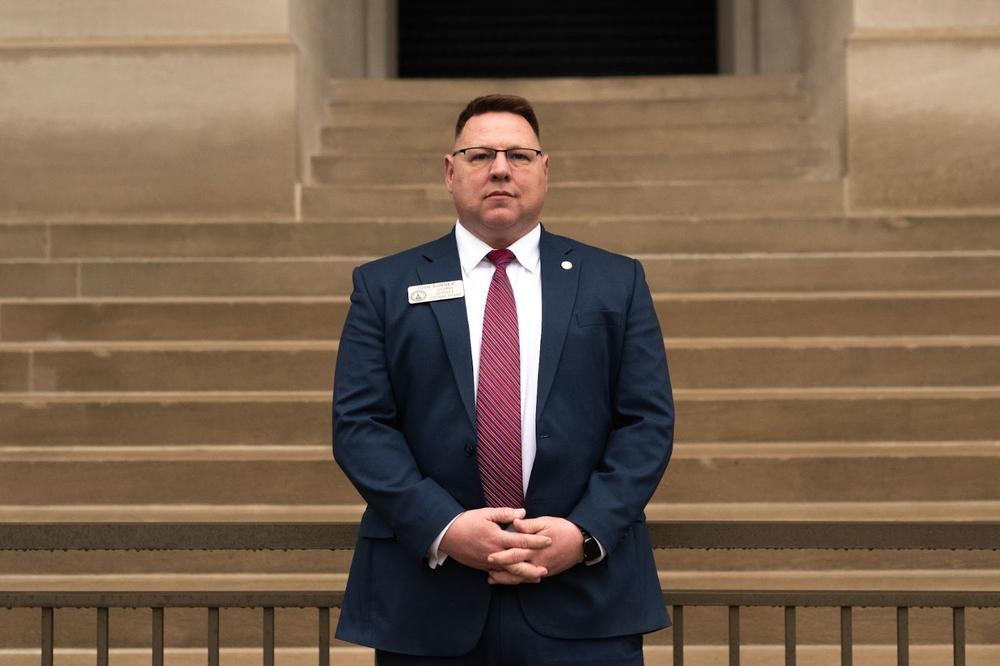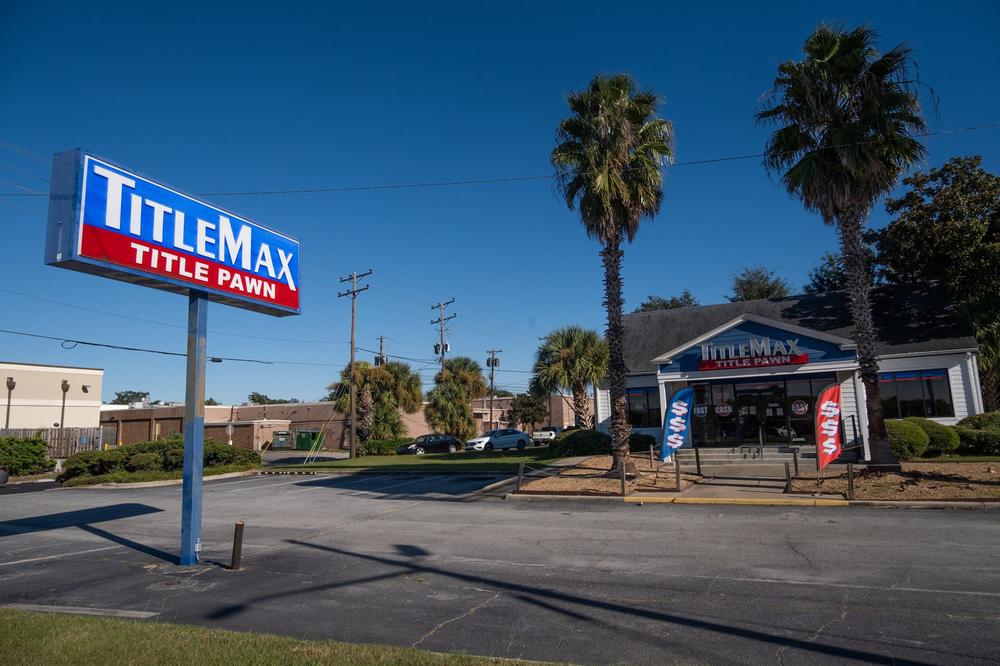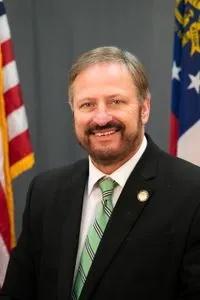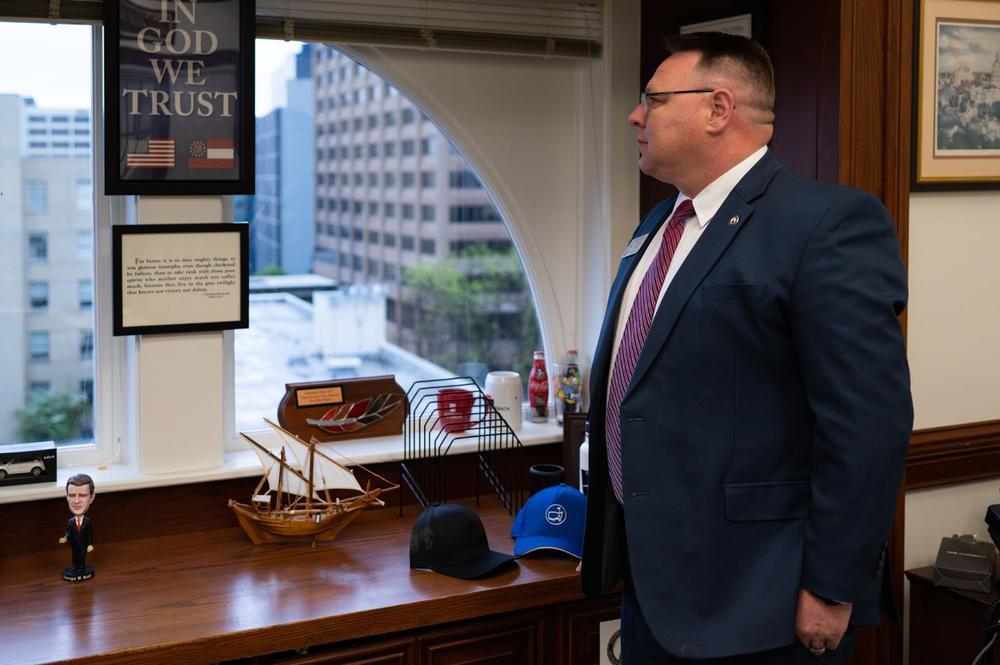
Caption
An illustration of two of Georgia's top title lending companies, TitleMax and LoanMax Title Loans. State lawmakers have sought to better regulate the title lending industry — without success.
Credit: ProPublica

An illustration of two of Georgia's top title lending companies, TitleMax and LoanMax Title Loans. State lawmakers have sought to better regulate the title lending industry — without success.
by Margaret Coker, The Current, and Mollie Simon, ProPublica
In February, Georgia lawmaker Josh Bonner introduced a bill that he hoped would fix a thorny problem that entangles tens of thousands of state residents in debt each year.
The Republican state representative from Fayetteville, a southern Atlanta exurb, aimed to close a loophole used by title lenders, who offer short-term cash to customers in exchange for a lien on their car title. The industry can currently charge triple-digit annual interest, more than three times what state law allows other financial companies.
Bonner, a military veteran and a church deacon, was outraged by the threat posed to consumers, especially military members and their families. In late February, federal regulators fined Savannah-based TitleMax, the country’s largest title lender, $15 million for multiple violations of the federal law that protects members of the armed forces from predatory, high-interest loans.
“I wondered, ‘How can this be legal, and who wouldn’t want some common-sense reform?’” Bonner recalled.
Bonner, a past House floor leader who whipped votes for Gov. Brian Kemp, isn’t an outsider to the corridors of power at the Georgia Capitol. Yet, within a month, his bill died in the House Banks and Banking Committee — the sixth time in nearly two decades that Georgia Republicans tried and failed to erect better guardrails for the industry.
In Georgia, political observers said, the top-down nature of the legislature meant the measure had no chance without the support of top GOP statehouse leaders — whose cozy donor relationships with title lenders have stood in the way of reform.

Georgia state Rep. Josh Bonner introduced a bill this year to regulate title lenders to better protect consumers.
David Ralston, the House speaker who died unexpectedly in November, never brought a reform bill to a floor vote during the 12 years he ran the lower chamber. In the upper house, while a reform bill passed the Senate Finance Committee in 2020, Senate leaders didn’t schedule a floor vote, leaving it to die. In more than four years as governor, Kemp, now the party’s most powerful state leader, hasn’t taken a position publicly on the industry, despite having voted for a reform bill earlier in his career as a state senator.
“There’s a venerable tradition here, no matter who is in charge, that change happens slowly — or until you reach the ear of a senior politician or his wife,” said Richard Griffiths, president emeritus of the Georgia First Amendment Foundation and an advocate for greater government transparency in Georgia.
Georgia is home to two of the nation’s largest title lenders: TMX Finance, the parent company of TitleMax, which posted $910 million in revenue in 2019; and Alpharetta-based Select Management Resources, which owns the brand LoanMax. The companies and their founders have spent millions of dollars trying to defeat regulation attempts both in Washington, D.C., and in state legislatures across the country.
The two companies have prioritized lobbying statehouse leaders and leadership committees over rank-and-file members, according to an analysis of campaign finance data compiled by The Current and ProPublica.

In late February, the Consumer Financial Protection Bureau imposed a $15 million fine against Savannah-based TitleMax for violating the federal law that protects military members from predatory, high-interest loans.
State Sen. Nan Orrock, a Democratic member of the Senate Finance Committee, said the two companies promote their interests by leaning heavily into “a strong mode of thinking here that all business is good for the state.” She added, “This is an industry that pushes that pro-business sentiment all the time.”
Top GOP leaders, including Kemp, either declined to comment or did not respond to questions for this story. TMX Finance and Select Management did not respond to questions for comment.
The situation rankles the portion of state Republicans who have led the charge for more regulation of the industry since taking over both chambers of the legislature in 2005.
“Privately my colleagues all tell me that almost no one is against reform,” said state Sen. Chuck Hufstetler, who chairs the Senate Finance Committee and is in favor of reform. “But publicly we can’t get that support.”
Title lending has been around in Georgia since the 1980s, catering to people who are often written off as credit risks by traditional lending institutions. It has drawn legislative ire almost from the start.
In 1995, a state Senate panel convened hearings to investigate the industry. “They practically get to write their own rules and rates,” then-state Sen. René Kemp, who represented Hinesville — the former hometown of TMX Finance founder Tracy Young — said at the time.
The industry really took off in the middle of the next decade. In 2005, both parties introduced bills that would have increased consumer protection against title lenders by forcing them to adhere to the state usury law that caps interest rates at 60%.
In response, Select Management’s founder, Rod Aycox, told The Atlanta Journal-Constitution that he had asked the American Legislative Exchange Council, a conservative policy think tank, to draft a model title lending bill that would have removed interest rate caps altogether for the industry.
Aycox took the model legislation to then-House Rules Committee Chairman Earl Ehrhart. The powerful Republican lawmaker, who, according to the Journal-Constitution, accepted free flights on planes owned by TitleMax and Select Management, pushed Aycox’s bill forward. Ehrhart declined to comment for this story.
In the end, neither the reform bills nor the model legislation survived, preserving the status quo that benefits title lenders by allowing them to operate under pawn shop statutes, instead of banking laws, and remain exempt from oversight by the state Department of Banking and Finance and usury caps. Instead, they can continue to charge up to 187% annual interest.
Since then, title lenders have been working behind the scenes to maintain the regulatory status quo. TMX Finance, Young and his wife, Beverly, have contributed more than $1.8 million in Georgia since 2006, with approximately a third of those funds going to political action committees, such as the Georgia House Republican Trust, according to an analysis of campaign finance data by The Current and ProPublica. Aycox, his immediate family and his corporate holdings have given $1.4 million during the same period.
These contributions are relatively modest compared to other industries. The political action committees for the NRA and Planned Parenthood, for instance, spent more than $600,000 each in the state in 2022 alone.
But title lenders have given consistently to legislative leaders. Among the chief recipients of these contributions were former House speaker Ralston and his longtime confidante Jon Burns, who was elected to take over Ralston’s position this year.
The two industry executives and their companies have also given generously to other lawmakers in a position to bottleneck any reform legislation — including the Georgia House whip, who controls the GOP caucus leadership committee, and the Senate majority whip, who controls floor votes, as well as the lieutenant governor, who controls the Republican caucus in the upper house.
A top lobbyist for Select Management, Raymon White, also helped raise money for Burt Jones’ successful 2022 bid to become lieutenant governor and thus president of the Senate. Jones was among the fake Trump electors in the former president’s bid to overturn the 2020 election results in Georgia. The rest of the fake electors are being investigated by a special grand jury, but a judge exempted Jones from being questioned by the district attorney in charge of the case. Neither Burns nor Jones responded to requests for comment.
The industry’s hold on Georgia lawmakers contrasts sharply with what has taken place in other states, including South Dakota, Virginia, Illinois and New Mexico. Lawmakers in these states have passed stricter laws that capped annual interest rates at 36% on subprime financial loans. That rate cap mirrors the federal Military Lending Act that protects military members and their families from predatory loans.
Economic studies from some of those states suggest many of the arguments advanced by title lending companies — including that lower interest rates would cause lending to high-risk people to dry up — are hollow.
In South Dakota, for instance, a citizen-led referendum in 2014 led to the passage of a 36% annual interest rate cap for financial products sold in the state. Title lenders stopped doing business there, but new credit lenders stepped in, and consumers ended up with more choice and lower interest rates, according to a four-year economic study conducted by the Center for Responsible Lending. “The only group that lost in this scenario were the title lenders,” said Steve Hinkey, a South Dakota pastor who as a then-Republican lawmaker spearheaded the referendum.
Illinois reported similar findings after that state passed a 36% cap on interest rates for consumer financial products.
In 2020, Georgia Republicans tried again to rein in the industry, which issues new title pawns for about 75,000 vehicles per year in the state. State Sen. Randy Robertson, a Republican from Cataula, introduced a reform bill after hearing from a constituent who was stuck paying the high-interest debt on her stepfather’s title pawn after he moved into a nursing home.
Robertson’s bill aimed to bring title lending under the purview of the state Department of Banking and Finance and banking laws instead of pawn shop statutes, which would have capped interest rates at 60%. The bill also aimed to close another loophole: Georgia pawn shop statutes allow title lenders to keep the profits from selling cars that they repossess due to nonpayment — even if the profits from the car sale are greater than the original debt.
“Just because something is legal doesn’t mean it is moral,” Robertson, a retired police officer, told The Current and ProPublica.
The bill passed in committee, despite industry pushback, when Sen. Hufstetler, the committee chairman, broke a deadlock by voting in favor of the measure. Senate leaders, however, did not schedule a floor vote.

State Sen. Chuck Hufstetler, who chairs the Senate Finance Committee, believed a bill to reform the title lending industry would have enough support to pass a full Senate vote this year. It didn’t happen.
Two senior Republican lawmakers, speaking about private discussions among state GOP leaders on the condition that their names not be used, told The Current and ProPublica that they support a change in the title lending laws. But one of the reasons party leaders tabled reform legislation in 2022, they said, was for fear of angering deep-pocketed corporate supporters at a time when GOP incumbents were fighting tough primary battles with insurgent pro-Trump members of the state party.
With the war chests accrued from donors like TitleMax’s PAC, House and Senate Republican caucuses spent months trying to protect state leaders, such as Kemp and Attorney General Chris Carr, from GOP rivals during primary races. They also wanted to keep people like Aycox, a known Donald Trump loyalist, on the Kemp side of the party candidate list. “It was a battle royal, and we couldn’t afford any defections,” said one of the senior Republicans about the 2022 primary races.
When the 2023 legislative session commenced in January, Hufstetler told The Current and ProPublica that, if a new reform bill were introduced, he believed it would have enough support to pass a full Senate vote.
But that didn’t happen. On the evening of Jan. 26, the same day the Senate GOP caucus released its legislative priorities, Select Management held a $10,000 dinner open to the Senate’s Republicans, according to a lobbyist disclosure report filed by White. It was the most money paid by an individual corporation — rather than an association or trade group — for a lobbying event during the first two months of the legislative session, and the sixth-highest lobbying expenditure overall during the same period. Georgia campaign disclosure laws do not require any further disclosure by lobbyists about who attended the dinner or the location of the event.
Hufstetler said he did not attend the January dinner. A spokesperson for Jones said the event was not listed in his diary but could not confirm if he attended. No other Republican senator responded to questions about the dinner.
When asked whether he considered the dinner a success, White declined to comment.
Meanwhile, TitleMax sponsored a breakfast for the House majority whip’s team on the same day Bonner’s bill was scheduled for its committee hearing.
Almost immediately after introducing his reform bill, Bonner received his first baptism from the industry. Within three hours, he got a call from the TitleMax vice president of government relations — a Republican legislative veteran who lives in Bonner’s district. On this call and in meetings with lobbyists, he heard the same arguments the industry has made for nearly 20 years.
Bonner, though, wasn’t convinced by their arguments. In fact, he became more supportive of reform after he heard that the Consumer Financial Protection Bureau had found TitleMax to be in violation of the Military Lending Act. The federal regulator found that the company sold their high-interest title loans to military members and their families in multiple states, including Georgia. TitleMax has denied wrongdoing.
Bonner, who was a military intelligence officer and now chairs the Georgia House Defense & Veterans Affairs Committee, considered that behavior beyond the pale. “Frankly, if a law is good enough for our servicemen and women, it should be good enough for all Georgians,” he said.
By Bonner’s count, 11 of the 28 members of the House Banks & Banking Committee had signed their support for his bill by the time the chairman scheduled a hearing. But Rep. Noel Williams Jr., a Republican who hails from Cordele, a city of 10,000 residents and four title pawn shops, told The Current and ProPublica that he warned Bonner in advance that he wasn’t going to call a vote.

Josh Bonner, a military veteran, was outraged by the threat that the title lending industry poses to consumers, especially military members and their families.
After a marathon day of voting on the House floor, the committee hearing came to order in the late afternoon. Bonner was last on the agenda. He spent approximately five minutes speaking on behalf of the 46-page bill. “There is no state-level oversight of this industry, which often operates in underserved communities and can often trap people in a cycle of debt that can last for years,” he told the committee.
At least six industry executives and lobbyists were in the dark-paneled chamber ready to argue the other side, after a brief summary of support by the lobbyist for Georgia Watch, a consumer advocacy group.
Travis Bussey, the vice president of government relations at TMX Finance, spoke first, telling the lawmakers that the company was “not opposed to reform,” just deeply opposed to Bonner’s bill. The company’s general counsel chimed in saying the legislation was poorly written.
John McCloskey, a vice president and general counsel for Select Management, said the bill would make it impossible for title lenders to survive in Georgia.
When Republican Rep. Emory Dunahoo, who favors reform, asked McCloskey in a soft-spoken Southern drawl to explain how a financial services company would not turn a profit by charging 60% interest, McCloskey demurred.
Rep. Will Wade, a floor leader for Kemp, was one of several on the Republican side who expressed ambivalence about the bill, saying he understood the current regulatory environment made it difficult for lenders to make money.
As Williams gaveled out, he said he looked forward to working with stakeholders to advance the bill at a later time. The cluster of industry executives and lobbyists moved forward to shake his hand. Six of the industry executives and lobbyists in attendance declined to answer questions posed by The Current and ProPublica.
Later that evening, Bonner sounded vexed as he dissected his failure.
“They used the tired but time-honored excuse that they look forward to working with me in the future,” he said with a sigh. “I was hoping that future would start sooner. ”
This article was produced for ProPublica’s Local Reporting Network in partnership with The Current. Sign up for Dispatches to get stories like this one as soon as they are published.
This story comes to GPB through a reporting partnership with The Current. and ProPublica.
